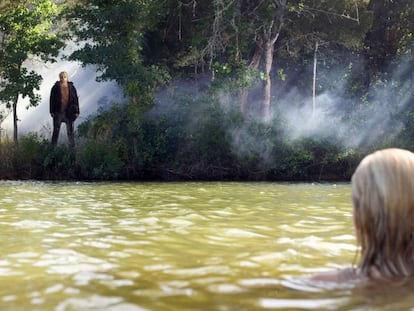'Give It Back': The ruthless Philippou brothers shock with their sadism toward children.

A type of opinion piece that describes, praises, or criticizes, in whole or in part, a cultural or entertainment work. It should always be written by an expert in the field.
There are films that are placed in front of the viewer as if they were a punch. But there are others—less frequent, more uncomfortable—that do so as if they were a mirror. A dirty, cracked one, placed just inches from the face. In that broken glass, the Philippou brothers have decided to reflect not fear, but the purest and most intolerable suffering: that of childhood. With Give It Back to Me , their second feature film after the stupendous debut of Talk to Me , they not only raise the stakes, but they also dynamite the entire board. And, perhaps, in that explosion, they have lost the balance between art and atrocity.
The game isn't one of supernatural terror fused with adolescent anxiety. There are no suburban house parties or challenges between college students with cell phones. Here, hell takes the form of a crazed mother and eight-year-old victims, in one of those houses of horrors that are unfortunately real, even in Spain. But its violence—realistic, dry, overwhelming—is no longer frightening: it generates physical anguish. The camera doesn't linger on cheap scares, but instead revels in the detailed exposure of childhood pain. And that, even though it's extraordinarily well-acted—with a prodigious Billy Barratt and a moving Sora Wong , a partially blind actress in a blind role—is, at times, unbearable.
The proposal slides dangerously along that fine line that separates the artistic from the sadistic. There's no room for the ambiguity of pain as a means of reflection. Not with enough sophistication, at least. Give It Back to Me relegates Carrie to a children's story and French New Extremism to an almost lighthearted horror dynamic . What we have is an almost pornographic exposition of the psychosis of adult grief and childhood suffering. A ruthless stimulation of empathy that turns the viewer not into an accomplice, but into a hostage.
The mythology the Philippous propose, with its echoes of HP Lovecraft and the uncanny, never quite gels. Its internal logic is erratic, and its narrative development disconcerting, especially in a final act that abandons all police procedural plausibility to embrace the most pedestrian clichés of a television thriller . One then wonders if this initial commitment to realistic brutality deserved a more coherent ending than that of a run-of-the-mill film.
And yet, the cast is impeccable. Sally Hawkins , who was actually already a bit scary with her somewhat extravagant sweetness in Mike Leigh 's films—and in a casting decision similar to the inclusion of Hugh Grant in Heretic— is transformed into a devouring figure. But it's not enough. Give It Back proposes a descent into hell without a safety net, without irony, without consolation. And it does so with as much formal effectiveness as it lacks critical distance.
The final shot, the only moment of true visual expression, could have redeemed the whole. But it comes too late. Its unbearable explicitness of imagery, with the children as protagonists, borders on humiliation. And at its core, it's a film that doesn't ask anything. It just shows. It's sadistic toward its child characters, and also toward the audience.
Directed by: Danny and Michael Philippou.
Starring: Sally Hawkins, Billy Barratt, Sora Wong, Jonah Wren Phillips.
Genre: Horror. Australia, 2025.
Duration: 99 minutes.
Premiere: August 1st.
Do you want to add another user to your subscription?
If you continue reading on this device, it will not be possible to read it on the other device.
ArrowIf you want to share your account, upgrade to Premium, so you can add another user. Each user will log in with their own email address, allowing you to personalize your experience with EL PAÍS.
Do you have a business subscription? Click here to purchase more accounts.
If you don't know who's using your account, we recommend changing your password here.
If you decide to continue sharing your account, this message will be displayed indefinitely on your device and the device of the other person using your account, affecting your reading experience. You can view the terms and conditions of the digital subscription here.

Film critic for EL PAÍS since 2003. Film professor for the Madrid College Board. Contributor to 'Hoy por hoy' on SER and 'Historia de nuestro cine' on TVE's La2 channel. Author of 'From Snow White to Kurosawa: The Adventure of Watching Movies with Your Children'. A lifetime of enjoying films; half a lifetime trying to unravel his art.

EL PAÍS






